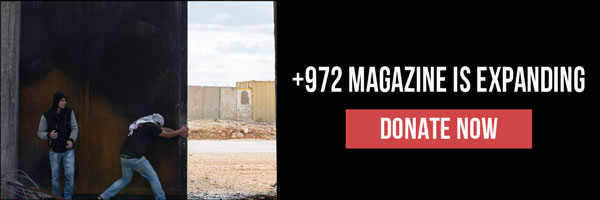From vowing never to join forces with Arab political parties to saying there’s no reason to remove settlements, Labor’s new leader has alienated many on the Left in recent months. His latest move, supporting the deportation of asylum seekers, is different.

Last July, Avi Gabbay was elected chairman of the Labor party on the promise to return the party to power. Since then, Gabbay has staked out positions considerably to the right of Labor’s traditional base, leaving many on the Left frustrated, even devastated. Labor gained ground in the 2015 elections because it cast itself as the anti-Netanyahu; now, Labor voters worry, Gabbay is turning into Netanyahu.
Gabbay was always an unconventional choice for Labor. A former head of the Israeli telecom giant Bezeq, Gabbay was among the founding members of Moshe Kakhlon’s center-right Kulanu party, and even served as minister in the current government, resigning in May of 2016 to protest the appointment of Avigdor Liberman as defense minister. While Gabbay’s rivals in Labor raised questions about his right-wing past, the party ultimately decided to give him a chance.
Religion and state? Okay
The first sign of trouble came shortly after Gabbay’s election, in August, when he appeared at an event about religion and state alongside Education Minister Naftali Bennett in the West Bank settlement of Efrat. Bennett, at the time, was facing criticism from secular Israelis who were angered by his changes to the Israeli public school curriculum, which they felt amounted to religious indoctrination. While Gabbay did criticize Bennett’s changes to the curriculum, he made a concerted effort to appeal to the religious right. “I have no problem if my son learns Talmud,” Gabbay said.
‘We have nothing in common with them’
In early October, at a speaking event in Beer Sheva, Gabbay announced that he would refuse to form a governing coalition that included the Joint List, the political heterogeneous union of Arab parties and the third largest party in the Knesset. “We have nothing in common with them,” he said. Gabbay’s stance on the Arab parties was in practice not significantly different from that of his predecessor, Isaac Herzog, but the absolute rejection of partnering with Arab parties ruffled feathers even within his own party.
Threatening to kick out Labor’s only Arab MK
Two weeks later, when Labor MK Zuheir Bahlul announced he would not attend the Knesset’s celebration of the 100th anniversary of the Balfour Declaration, Gabby reportedly threatened that Bahlul “won’t sit in the next Knesset session,” adding that he was tired of “this kind of extremism.” Gabbay’s public threats against his party’s only Arab MK disturbed many in Labor and on the left. “From his response to Bahlul,” the Haaretz editorial board wrote, “[Gabbay] has proven himself to be a nationalist like all the others—someone who does not want Arabs in the governing coalition, or in his party.”
Settlements are here to stay
Gabbay further frustrated members of his own party when he declared that no settlements would need to be evacuated in a future peace agreement. Tzipi Livni was quick to release a statement that Gabbay’s views did represent hers or those of the Zionist Union, the merger of the Labor party and Livni’s Hatnua. Despite the controversy, Gabbay’s comments, again, reflected more of a shift in style than in substance. Herzog, during his time as Labor chairman, also did not exactly take a pro-peace position, claiming that now was not the time to attempt a two-solution.
Gabbay’s strong statement in favor of keeping the settlements in place did not sit well with others on the left either. Meretz MK Ilan Gilon remarked at the time that Gabbay seemed “to have forgotten that he was chosen to lead the alternative to the Likud.”
Adopting Netanyahu’s disdain for the Left
If pandering to the religious right, threatening an Arab member of his party, and cozying up to the settler lobby wasn’t enough, Gabbay appeared to cross another line when in early November he echoed a famous Netanyahu comment that “the Left has forgotten what it means to be Jewish” — that the Labor party had chosen liberal values at the expense of Jewish values. Adopting a line associated with the beginning of Netanyahu’s tenure generated a firestorm.
The last, or latest, straw
Gabbay’s defenders have insisted that the rightward swing is all part of a strategy to return Labor to power—though it is a strategy that has been tried and failed before.
Yet Gabbay’s new direction for the party became more than just a change in rhetoric this week, when he ordered the party to support a bill that will allow the deportation and indefinite detention of asylum seekers living in Israel. Support for the bill does more than shift Labor’s location on the political map, it could have real consequences: the deportation of tens of thousands of people who have lived in Israel for years, putting many of their lives at risk.
Nine of the Zionist Union’s 23 MKs opposed Gabbay’s decision. Sheli Yachimovitch, the former Labor chairwoman, said it “was morally impossible to support the bill.” Zuheir Bahlul remarked, “I cannot understand how the party can support an immoral, right-wing proposal to send the refugees to hell.”


